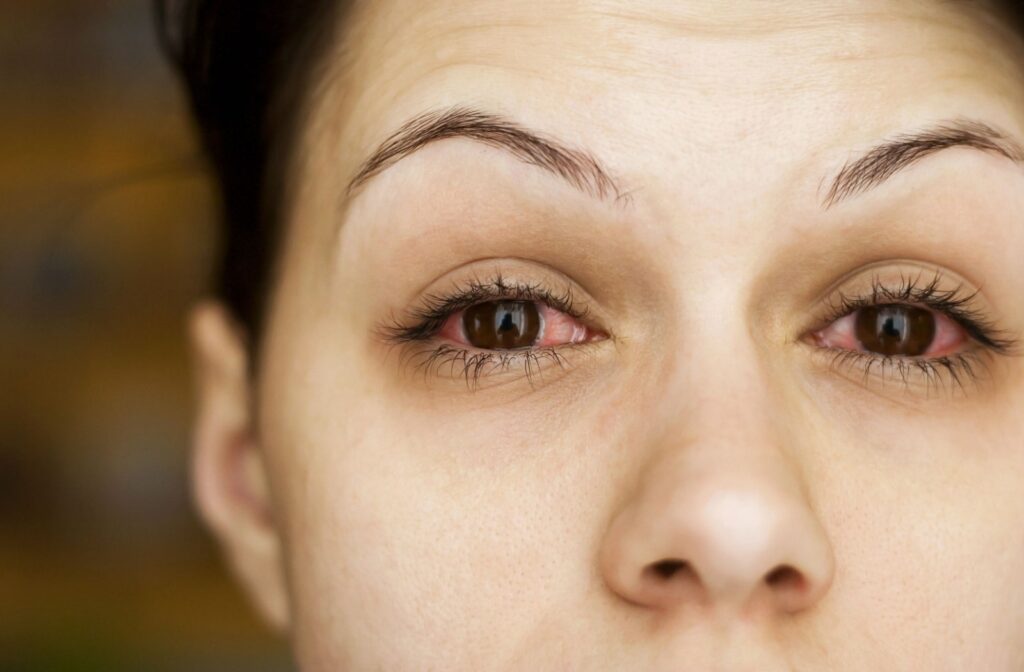If you have a dry, burning, gritty feeling in your eyes, you’re probably experiencing dry eyes. This is often caused by something called “meibomian gland dysfunction,” where the glands producing part of your tear film become blocked and plugged.
This can cause your tears to evaporate too quickly, leading to significant irritation and discomfort while your eyes are unprotected. So how do you treat this meibomian gland dysfunction?
At Focus West Optometry, we recommend a well-rounded approach through our dry eye therapy. We can use iLux® where gentle amounts of light-based heat stimulate the area to promote healthy tear production.
Then, we may recommend punctual plugs to prevent tear drainage, or a take-home dry eye therapy kit with eye drops, lid hygiene wipes, and vitamins to encourage healthy tear production.
What Are the Meibomian Glands?
Inside your eyelids, right near the eyelashes, you have dozens of tiny little glands called meibomian glands. These glands have a simple, but extremely important, job—to secrete oils for your tear film. Your tears need these oils so they can properly function.
The tear film is made up of three layers:
- The inner layer of mucin that keeps the tear attached to the eye
- The central layer of water that helps flush contaminants away
- The outer layer of the oils produced in these tiny glands
These oils are necessary to prevent your tears from evaporating too quickly. When the meibomian glands are functioning properly, the tears can properly protect the eye, eventually evaporating away.
But when the glands are blocked, plugged, or impacted in any way, the oil secretion slows down significantly, leaving the tears to evaporate too quickly and the eye exposed.
This is called meibomian gland dysfunction. But why does this develop?
What Causes Meibomian Gland Dysfunction?
The human eye is incredibly complex, and it’s extremely sensitive. This means that when there’s a significant change—in the environment around you or your body—the eye can easily be impacted.
One of the most common factors that can cause meibomian gland dysfunction is your environment itself. If you’re somewhere that’s constantly dry, smoky, or windy, the eye needs to work harder to properly function. This can eventually lead to the meibomian glands slowing their oil production.
Other causes can include:
- Being exposed to dry moving air, like working near an air conditioner or space heater
- Age-related changes in the eye
- Hormonal imbalances
- Poor nutrition and vitamin deficiencies
This is why it’s so essential to learn the signs and symptoms of meibomian gland dysfunction, recognizing that there’s a problem allows you to seek early treatment.
Signs & Symptoms of Meibomian Gland Dysfunction
When the meibomian glands become blocked or plugged, they can’t get the oils to your tear film. This means that your tears no longer have a proper composition, and they’ll start to evaporate too quickly, leaving the eye vulnerable. This can cause:
- Burning sensations in the eyes
- Light sensitivity
- Blurry vision
- Visible redness
It can also cause excessive tearing, but those tears often evaporate too quickly, rendering them ineffective at hydrating your eye.
While these symptoms are often more irritating than dangerous, ultimately, your tears are still necessary to protect your eye. If you leave these symptoms unaddressed for too long, you’re leaving your eye exposed to potential hazards. This can lead to corneal scratches and abrasions, which can cause significant long-term damage to your eyes and vision.
Is Meibomian Gland Dysfunction Treatable?
Thankfully, meibomian gland dysfunction is highly treatable. You’ll need to visit your optometrist as soon as you can to discuss treatment through dry eye therapy.
Here at Focus West Optometry, we often recommend the following treatment:
- iLux®, where gentle amounts of light-based heat are applied to the area around the eyelids. This helps break up oil blockages, allowing the meibomian glands to continue sending oils to the tear film uninterrupted.
- Punctal plugs, where tiny devices are inserted into the tear ducts. These help prevent your natural tears from draining away too quickly, stabilizing the tear film to reduce further symptoms of dry eyes.
- Take-home dry eye kits, where you can take home medicated eye drops to find temporary relief, and lid wipes to regularly clean your eyelids to prevent bacterial buildup. We also include supplements designed to promote healthy tear production.
This well-rounded approach is an extremely effective way to help you find relief from your meibomian gland dysfunction and dry eyes.
Try Dry Eye Therapy Today
If you’re experiencing burning sensations in the eye—or any other vision or eye problem—contact our team at Focus West Optometry. Our team is here to help you protect your eyes and preserve your vision. Don’t let meibomian gland dysfunction continue to cause you discomfort, book an appointment with us today!



